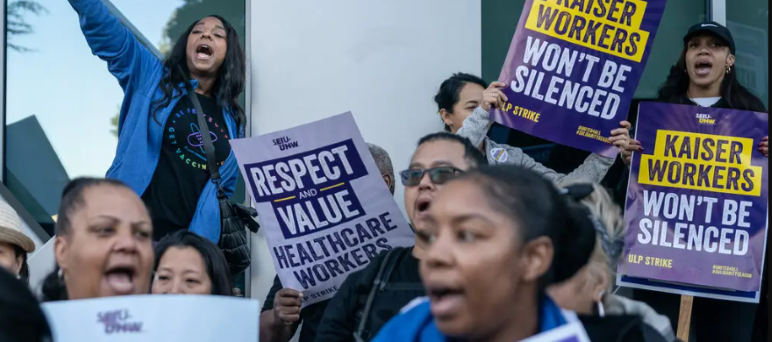Kaiser Permanente has an enormous footprint in California.
The organization, based in Oakland, is the largest private employer in the state, operating 36 hospitals and more than 500 medical office buildings in California. It provides coverage to roughly half of all Californians with private health insurance.
So it’s an especially big deal for the state that Kaiser employees have begun what labor leaders are calling the biggest health care strike in recent U.S. history. The three-day action that ends tomorrow includes more than 75,000 workers in eight states and the District of Columbia, with more than 60,000 of those workers in California.
The strike, which includes laboratory workers, pharmacy technicians, phlebotomists and housekeepers, could cause delays for patients who are trying to get medical appointments, lab results or prescriptions.
Doctors and many nurses are not involved in the strike, but Kaiser officials warned that even so, some non-urgent procedures might be postponed, some clinic hours might be reduced and phone waiting times could be lengthy. Some locations have also closed temporarily or are operating with reduced hours. Kaiser has said that it is keeping all of its hospitals and emergency departments open.
California’s high cost of living and growing income inequality have helped embolden workers to take more job actions: Housekeepers, Los Angeles city workers, McDonald’s employees, dockworkers, and Hollywood writers and actors all went on strike this year.
Kaiser Permanente workers are calling for higher wages and higher staffing levels, saying that staffing shortages at their hospitals and clinics were making it impossible to provide adequate care to patients.
Edward Lopez-Matus, a Kaiser medical assistant on the picket line Wednesday morning, said he was often assigned to help two doctors instead of one, because his team was so short staffed. Stretching workers that thin makes patients wait longer and increases the chance of making mistakes, he said.
“That’s not the care our patients need,” said Lopez-Matus, who has worked for Kaiser Permanente for seven years. “Our patients need our undivided attention.”
He and hundreds of other health care workers picketed outside a medical center in San Francisco. Drivers on Geary Boulevard honked as the strikers, many wearing purple and yellow, flooded the sidewalks and medians, cheering and rattling tambourines.
Lopez-Matus said that to make ends meet, he drives for Uber 40 hours a week, on top of his full-time job at a Kaiser family practice clinic in San Francisco.
“My entire paycheck goes to rent,” said Lopez-Matus, who lives in Daly City, just outside San Francisco, and has two teenage children. “It’s ridiculous.”
Timothy Regan, a clinical health educator for Kaiser Permanente in San Francisco, said he came out to protest on Wednesday because he thought the health system’s executives weren’t bargaining in good faith with the union. He said he was grateful for his job, which he’s held for 25 years, and felt that he needed to ensure good working conditions for the next generation.
“We want that collaborative good faith partnership, and we wanted it months ago,” Regan said. “Many of us are surprised, actually, that it got to this point.”
Kaiser Permanente officials said that they were working with union leaders to resolve the strike and that there had already “been a lot of progress.”
“We remain committed to reaching a new agreement that continues to provide our employees with market-leading wages, excellent benefits, generous retirement income plans, and valuable professional development opportunities,” the organization said in a statement on Wednesday.
Soumya Karlamanga is a reporter with The New York Times. Copyright, 2023, The New York Times.


Care at Kaiser has plummeted the last few years – and the constant bickering from labor unions only makes this process more frustrating for members (same as teacher unions and every other union in CA). On top of that, Kaiser is raising rates 10%+ for a diminished product – and they have a completely disgruntled workforce. Kaiser is the closest thing you can get to a public hospital – and it feels like it. I am jumping to Anthem during this open enrollment.